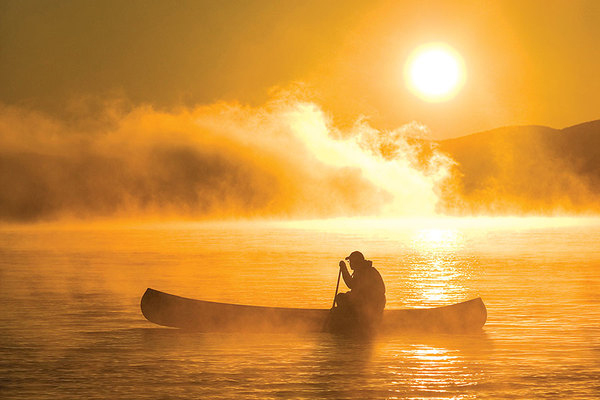當(dāng)前位置: Language Tips> 英語(yǔ)學(xué)習(xí)專欄
分享到
冬日,卻殘留著許多秋日的清爽。
我泛舟于佩河之上,碰到另一位泛舟者。
我們駛近對(duì)方,抓住對(duì)方的舷緣——泛舟者之間獨(dú)有的擁抱。
"這難道不是個(gè)奇跡嗎?"
"這樣的機(jī)會(huì)確是難得!"
難忘的泛舟之旅,人生能有幾次機(jī)會(huì)?

By Robert Klose
文瑋 選注
In all my years in Maine I have never experienced a winter like this. Where there should be snow, there is green grass. When I should be bundled to the hilt, I am outside in shirtsleeves. And where the river behind my house should be frozen from bank to bank, it runs freely.
I took what I thought was my last canoe ride in October, when the bordering woods were embroidered with reds and golds and the cool air still bore a hint of warmth when the breeze died down. Reaching over the gunwale, I dipped my hand into the water and one thought occurred to me: "swimmable." But I resisted temptation and, with November's advent, put the canoe up for the season.
As it turned out, I was premature. These early winter days have been nothing short of gracious, perhaps an attempt by nature to reset the balance by rewarding us for what we endured last winter, when snow fell upon snow until there was no place for the plows to put it.
And so, seizing the moment late last month, I untarped the canoe, grabbed my paddles and life jacket, slipped the old girl into the water, and set out.
Having paddled the Penobscot only during the warmer, more cooperative seasons, I was immediately struck by how different this winter world on the river was. In summer the trees are full of leaves and the banks thick with sedge, forming soft borders that give me a sense of embrace. Winter is different. The abrupt leaf-fall of autumn was like a curtain rising, exposing actors - trees - stripped to their bare bones, giving the woods a transparency that made me feel connected to a much wider world. How could I not think of Robert Frost's iconic poem "Stopping by Woods on a Snowy Evening," with my canoe the steed and I the observer? The woods are lovely, dark and deep...
I paddled on. My strokes were sure and smooth, but every so often, when I'd get mesmerized by the sheer silence and the gift of having the river all to myself, the paddle blade would slap the water and throw spray up onto my hand. I felt the chill from a river that, by all rights, should have been frozen solid by now. In fact, the cold told me that it was willing to freeze, if only the temperature would dip and give it a chance.
I paddled on, and two of my neighbors, a couple, strolled down to the riverbank. "Good for you!" the man called, waving, as if cheering a heroic deed. And farther down, an unanticipated moment - another canoeist, plying his languid way upriver. We drew close and grabbed hold of each other's gunwales, a fraternal clasp peculiar to canoeists.
"Isn't this something?" he remarked as we bobbed under a slate-gray sky. "We won't see many more opportunities like this," I replied.
It was idle banter, but heartfelt, and appropriate, for what more could be said? We let go and the river separated us again.
The rest of my ride was solitary. The river was moving so slowly that it was more like a lake on which I felt I could commit myself to a good, long stay. I checked the time and realized that I needed to meet a class at the university where I teach. But then again, if I didn't go, would my students protest? And, the next day, given the excuse that I didn't come to class because the day was so beautiful and I just had to be on the river, would they understand?
I reached over the side of the canoe, ran my hand through the water, and thought: The river's lovely, dark and deep, but I have a promise to keep....
And so I put in to shore, pulled the canoe onto the bank, and turned it over, its slick, wet belly shiny in the weak light of a winter day. I ran my hand over it, as if lulling it to sleep. This had surely been my last opportunity for a canoe ride until spring.
But then, again, who knows?
Vocabulary
1. Penobscot: 佩諾布斯科特河,美國(guó)緬因州中部河流。
2. Maine: 緬因州,美國(guó)東北部新英格蘭的一個(gè)州,北臨加拿大魁北克省,東臨加拿大新不倫瑞克省及大西洋。
3. bundle: 束,捆,這里指裹著厚厚的衣服;to the hilt: 完全地,徹底地;in shirtsleeves: 只穿襯衣(不穿外套)。
4. 我上一次泛舟是在十月,當(dāng)時(shí)秋葉黃如金、紅如火,星星般點(diǎn)綴著沿河的樹(shù)林,微風(fēng)吹過(guò),空氣中尚有一絲暖意。我以為那會(huì)是我今年最后一次泛舟了。embroider: (在……上)刺繡;bear: 吹動(dòng),傳送。
5. gunwale: 舷緣,舷邊。
6. premature: (做事)過(guò)早的,過(guò)快的。
7. 這段早冬日子簡(jiǎn)直是天賜的仁慈,這也許是大自然的一種補(bǔ)償方式,為了平衡我們?nèi)ツ晁?jīng)歷的冷酷無(wú)情的嚴(yán)冬。那時(shí)漫天鵝毛大雪,下個(gè)不停,直至鏟雪機(jī)也無(wú)處安置它們了。nothing short of: 毫不遜于……,簡(jiǎn)直就是……(用于強(qiáng)調(diào))。
8. untarp: 揭開(kāi)蓋在……上的防水帆布;paddle: 短槳;the old girl: 此處指的是作者的劃艇。
9. sedge: (生長(zhǎng)于潮濕處的)苔草;embrace: 擁抱。
10. 出其不意的秋日落葉就像升起的帷幕,將演員——樹(shù)木——光禿禿的骨架裸露在外,整片樹(shù)林變得透明,使我恍惚接觸到了一個(gè)更為廣闊的世界。abrupt: 突然的,出其不意的;transparency: 透明,透明度。
11. Robert Frost: 羅伯特?弗羅斯特(1874-1963),美國(guó)詩(shī)人,善用傳統(tǒng)詩(shī)歌形式和口語(yǔ)表達(dá)新內(nèi)容和現(xiàn)代感情名字、作品主要描寫(xiě)新英格蘭的風(fēng)土人情,四度獲得普利策獎(jiǎng)。名作有《雪夜林邊小駐》、《未選的路》和《白樺樹(shù)》;steed: 馬,坐騎。
12. stroke: (劃船的)一次劃水;mesmerize: 迷惑,迷住;paddle blade: 槳葉;slap: 啪啪地撞擊,拍擊;spray: 浪花,水花。
13. dip: 減少,降低。
14. unanticipated: 不曾預(yù)料到的;ply: 定期往返;languid: 懶洋洋的,沒(méi)精打采的。
15. fraternal: 兄弟般的,親如手足的;clasp: 緊抱,緊握;peculiar: (個(gè)人或團(tuán)體)特有的看,獨(dú)具的。
16. be something: 真了不起,真精彩;bob: (在水面上)上下移動(dòng),起伏;slate-gray: 石板灰,青灰色。
17. banter: (善意的)取笑,打趣。
18. 此處仿照《雪夜林邊小駐》一詩(shī),原文是:The woods are lovely, dark and deep, / But I have promises to keep, / And miles to go before I sleep, / And miles to go before I sleep.
19. slick: 光滑的。
20. lull: 使入睡,使安靜。
(來(lái)源:英語(yǔ)學(xué)習(xí)雜志 編輯:董靜)
上一篇 : 騎車記:飛一般的自由
下一篇 :
分享到
關(guān)注和訂閱


口語(yǔ)
關(guān)于我們 | 聯(lián)系方式 | 招聘信息
電話:8610-84883645
傳真:8610-84883500
Email: languagetips@chinadaily.com.cn